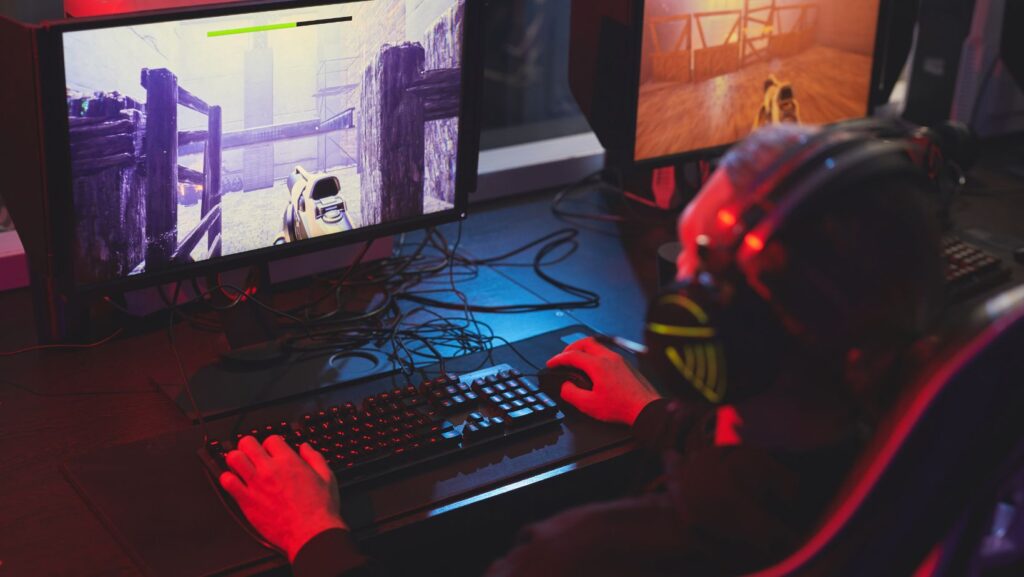Immerse yourself in the vibrant world of Korean video games, where innovation meets tradition, creating a captivating digital landscape. South Korea’s gaming industry, often overlooked, is a powerhouse teeming with creativity and technological prowess.
From high-octane eSports tournaments to immersive single-player narratives, Korean video games offer a diverse range of experiences. They’re not just games; they’re cultural phenomena that have shaped social interactions and transformed the entertainment industry. Let’s delve into the heart of this dynamic industry and discover what makes Korean video games a unique spectacle.
Korean Video Games
 The Korean video game industry has seen tremendous growth over the years, bettering the immersive experiences and cultural phenomena already established. Having its roots in the 1980s, the Korean video game industry proved resilient in the face of governmental restrictions that existed in the early years. Undeterred, developers forged a unique gaming culture driven by sheer creativity and the application of advanced technology. By the late 1990s, PC Bangs (Internet Cafés) became popular destinations, fostering a competitive environment that led to the proliferation of Multiplayer Online Battle Arena (MOBA) games, for instance, League of Legends. This wave of accelerated innovation ushered in the golden era of Korean video games, spanning from 2004 to 2011.
The Korean video game industry has seen tremendous growth over the years, bettering the immersive experiences and cultural phenomena already established. Having its roots in the 1980s, the Korean video game industry proved resilient in the face of governmental restrictions that existed in the early years. Undeterred, developers forged a unique gaming culture driven by sheer creativity and the application of advanced technology. By the late 1990s, PC Bangs (Internet Cafés) became popular destinations, fostering a competitive environment that led to the proliferation of Multiplayer Online Battle Arena (MOBA) games, for instance, League of Legends. This wave of accelerated innovation ushered in the golden era of Korean video games, spanning from 2004 to 2011.
The subsequent convergence of technologies facilitated the evolution of Korean video games, encouraging them to branch out into various genres, including mobile and virtual reality gaming. Primarily fueled by high internet speeds and smartphone penetration, Korean games today are characterized by their diverse play modes, catering to the tastes of millions globally.
In the bustling gaming landscape of Korea, several entities have made their mark. Nexon, a pioneer in the industry, developed the first graphic MMORPG (Massively Multiplayer Online Role-Playing Games) and introduced the freemium model into gaming. Then there’s Netmarble, known for its role in mobile gaming development and publishing global hits like Marvel: Future Fight.
Popular Genres of Korean Video Games
 Among the diverse pool of Korean video games, certain genres display notably higher popularity. These flavor-filled variety of worlds and gaming modes prove testament to the creativity and ingenuity that resonates through the Korean gaming culture. Massively multiplayer online (MMO) games and role-playing games (RPGs) hold primary spots in the Korean gaming sphere. Examples like “Lineage” by NCSoft and “MapleStory” by Nexon highlight the genre’s dominance. Both games, exhibiting intricate storylines and expansive worlds, attracted millions globally since the late 1990s. Released in 1998, “Lineage” pioneered the MMO genre, marking the start of an era where interactive, online worlds became a popular mode of gaming. Meanwhile, “MapleStory”, launched in 2003, introduced an innovative platform-style gameplay, defying traditional RPG norms. The game’s captivating narratives, engaging gameplay mechanisms, and the freedom offered to players to build unique characters all catered to the title’s exponential success.
Among the diverse pool of Korean video games, certain genres display notably higher popularity. These flavor-filled variety of worlds and gaming modes prove testament to the creativity and ingenuity that resonates through the Korean gaming culture. Massively multiplayer online (MMO) games and role-playing games (RPGs) hold primary spots in the Korean gaming sphere. Examples like “Lineage” by NCSoft and “MapleStory” by Nexon highlight the genre’s dominance. Both games, exhibiting intricate storylines and expansive worlds, attracted millions globally since the late 1990s. Released in 1998, “Lineage” pioneered the MMO genre, marking the start of an era where interactive, online worlds became a popular mode of gaming. Meanwhile, “MapleStory”, launched in 2003, introduced an innovative platform-style gameplay, defying traditional RPG norms. The game’s captivating narratives, engaging gameplay mechanisms, and the freedom offered to players to build unique characters all catered to the title’s exponential success.
Formerly known as a PC-dominated market, Korea’s shift towards mobile and casual games demonstrated the country’s adaptiveness to evolving game trends. Owing to the rapid penetration of smartphones, and a populace open to consuming content on-the-go, mobile games have witnessed an upsurge.
Cultural Impact of Korean Video Games
 Korean video games possess a profound cultural effect, transforming global gaming culture and molding the eSports phenomenon. Both these dimensions unfold in subsequent discussions, shedding light on the far-reaching implications of Korea’s gaming innovations. Korea’s masterstroke in the gaming domain has rippled across the globe, drastically altering how video games are perceived and played. One cannot dismiss the significant part Korea plays in spawning the Free-to-Play (FtP) model, a paradigm shift embraced by many game developers worldwide. Games like ‘Nexon’s Dungeon Fighter Online’ and ‘MapleStory’ epitomize this model, boasting millions of global users. Moreover, Korean game elements, such as intricate narrative design and user engagement mechanics, are evident in numerous foreign game creations, signifying Korea’s undeniable imprint on global gaming culture.
Korean video games possess a profound cultural effect, transforming global gaming culture and molding the eSports phenomenon. Both these dimensions unfold in subsequent discussions, shedding light on the far-reaching implications of Korea’s gaming innovations. Korea’s masterstroke in the gaming domain has rippled across the globe, drastically altering how video games are perceived and played. One cannot dismiss the significant part Korea plays in spawning the Free-to-Play (FtP) model, a paradigm shift embraced by many game developers worldwide. Games like ‘Nexon’s Dungeon Fighter Online’ and ‘MapleStory’ epitomize this model, boasting millions of global users. Moreover, Korean game elements, such as intricate narrative design and user engagement mechanics, are evident in numerous foreign game creations, signifying Korea’s undeniable imprint on global gaming culture.
Companies like Com2Us with their title “Summoners War”, and Netmarble with “Seven Knights”, reinvented mobile gaming. These games combined stunning graphics and narratives reminiscent of console games with the convenience of the mobile platform. Besides, their simplicity and uncomplicated mechanics catered perfectly to the increasing demand for casual, easily accessible games.



